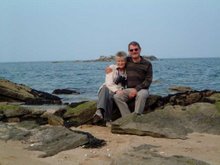Start: Thursday 9th March
The first blog is late this year, for no good reason! We’ll
be staying at our usual campsite, Los Madriles, so blogs will be posted only for
anything different that we do to avoid a repetition of previous years.
A moderate covering of snow on the car and caravan starting from home, but the forecast says we will run out of it as we head south. By the Dartford Crossing it’s gone.
Strong coastal winds are forecast for tomorrow, Friday, so we will take the inland motorway route through France. We arrive at a farm site near St Quentin, for two nights. The extra day is to shop for the fresh fruit, veg and meat we now can’t take from home because of Brexit. The latest forecast for wind gusts inland don’t sound too safe for towing anyway.
The farmer was most helpful; because the ground was soggy he
let us stay in the farmyard. Just an ordinary but peaceful farmyard, as the
photo shows. Not a rooster in sight (or sound).
Our route continued past Dijon and Lyon to the French Med..
We rested for a couple of days near Montpellier. The site was on a large estate
rather gone to seed as this photo of the big house shows.
However, the walking paths through the woods were excellent
and well marked. We came across an aqueduct that was built in the 17th
century to take water to the castle in the centre of the small town of Castries
close by. It is stated to be the largest private water system constructed in
France.
Next stop Cambrils, 80 miles south of Barcelona. The
campsite led directly onto the beach and the weather had turned warm so we
decided to stay for several days that turned into a week. The beach is a series
of horse-shoe bays like the one in the photo.
Much in evidence were flocks of parakeets, escapees from
captivity. They can overwhelm resident species, so it’s as well not to be too
carried away by their cuteness. Just like the grey squirrels in the UK.
The town of Cambrils is unremarkable but pleasant, with few
high-rise buildings . Walking from the campsite away from the town we were soon
on dirt roads and scrubland. This is typical.
Coming across a disused railway bridge in the middle of
nowhere we were amazed to find some exceptional quality artwork painted on the bridge
concrete support pillars. The following two photos are examples.
Next stage on the journey is to Calpe, not far from our final
destination. Calpe is famous for its rock, not as in the lettering thorough the
middle like Blackpool rock, but for its imposing size and nature reserve
status.
Nice beach, too, but it’s a mini Benidorm when you look the
other way towards the high rise apartments and hotels. No “Tea Like Mother
Makes” cafes though, just high class restaurants.
The old town, however, is charming, The first building in
this colourful alley displays a classy mural.
The part of the mural just out of camera is worth a closer
look because it’s a 3D galleon. High quality work.
This town square is typical old Spain, the blue and
white colours harking back to the occupation by the Moors (Arabs).
We see more paintings on buildings as we walk around; this
one covers the complete side of a large edifice and depicts a Moorish town
floating on a magic carpet platform with a couple more buildings underneath. But no
“Sinbad woz ‘ere” signature.
Back in the new town, health and safety falls far short of
UK standards. This guy is part of a team painting a tall block of flats, each
painter being sat on a wooden seat like a child’s swing, suspended from ropes
at the top that haul him up or down as required.
Near the rock was a large, shallow lake used from Roman times
until 1988 for extracting salt by evaporation. Now it serves to attract
migratory birds. This flamingo was close enough to make a nice photo.
No mention yet of the campsite. Very well run and
beautifully clean, with large but expensive pitches. Now spot the elephant in
the room!
It’s a tower block under construction, appearing to grow out
of our caravan roof. In reality it’s just beyond the camp boundary, and work
proceeded all day, every day. A long-term Brit we talked to said that you just
get used to it. Is that so? Time to move on!


















No comments:
Post a Comment